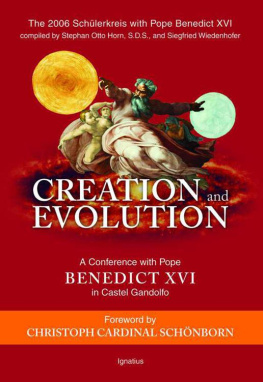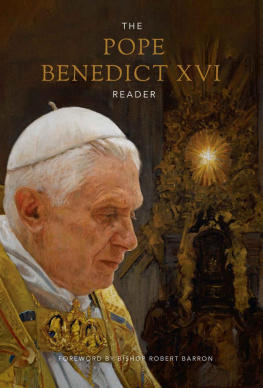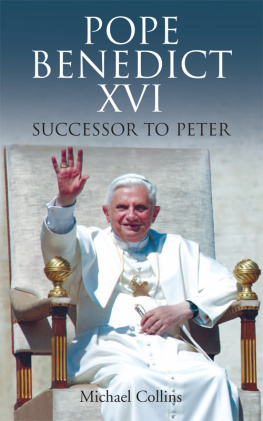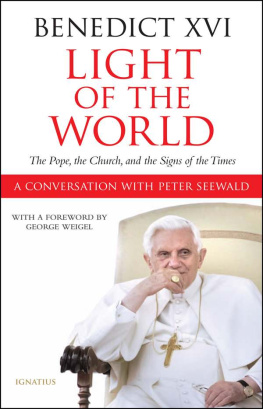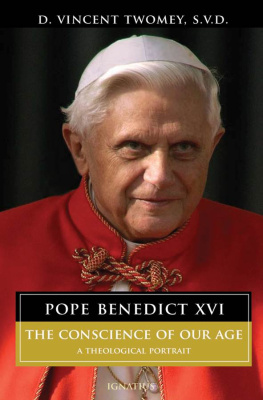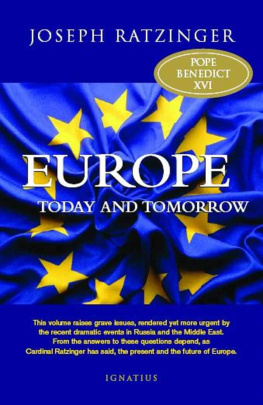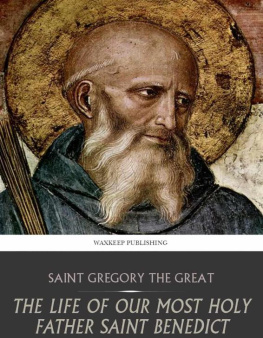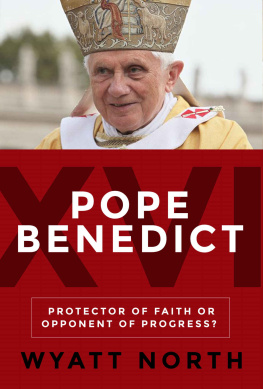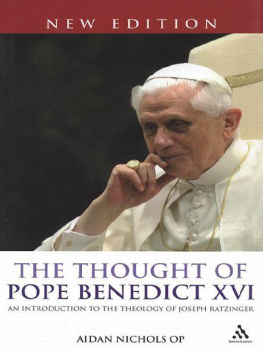CREATION AND EVOLUTION
CREATION
and
EVOLUTION
A Conference with Pope
BENEDICT XVI
in Castel Gandolfo
Published on behalf of
the former postgraduate students of Pope Benedict XVI
by Stephan Otto Horn, S.D.S., and Siegfried Wiedenhofer
Foreword by Christoph Cardinal Schnborn
Translated by Michael J. Miller
IGNATIUS PRESS SAN FRANCISCO
Original German edition:
Schpfung und Evolution
Eine Tagung mit Papst Benedikt XVI. in Castel Gandolfo
2007 by Libreria Editrice Vaticana, Rome
2007 by Sankt Ulrich Verlag GmbH, Augsburg
Cover art by
Michelangelo Buonarroti (1475-1564)
The Sistine Chapel ceiling frescos after restoration
The Creation of the Sun, Moon and Planets
The Sistine Chapel, Vatican Palace, Vatican State
Photo Credit: Erich Lessing / Art Resource, N.Y.
Cover by John Herreid, based on the German original
2008 by Ignatius Press, San Francisco
2008 by Libreria Editrice Vaticana, Rome
All rights reserved
ISBN 978-1-58617-234-3
Library of Congress Control Number 2007938139
Printed in the United States of America
CONTENTS
Christoph Cardinal Schnborn
PRESENTATIONS
Peter Schuster
Robert Spaemann
Father Paul Erbrich, S.J.
Christoph Cardinal Schnborn
Siegfried Wiedenhofer
FOREWORD
We are not some casual and meaningless product of evolution. Each of us is the result of a thought of God. Each of us is willed, each of us is loved, each of us is necessary.
Sermon of Pope Benedict XVI at the Mass for the inauguration of his pontificate
In 1985 a symposium took place in Rome on the topic of Evolutionism and Christianity. It was organized by Professor Robert Spaemann and his professorial chair in the philosophy faculty in Munich. It was hosted by the Holy Sees Congregation for the Doctrine of the Faith under the direction of its prefect at that time, Cardinal Joseph Ratzinger. What the current Holy Father wrote then in his Preface to the published proceedings of this symposium had the privilege of holding, at his invitation, from September 1-3, 2006, in Castel Gandolfo.
There was no lack of media interest in this meeting of the Schlerkreis . The debate about creation and evolution, about faith and science, about design or chance in the process by which our world came to be has made big waves in recent months. My article in the July 7, 2005, issue of The New York Times was something of a catalyst in this phenomenon. Of course, the debate has been going on for so long that it is part of the intellectual atmosphere. It has been revived again and again by many factors, and it is far from being over. And it is urgently needed. In numerous commentaries, Pope Benedict XVI has tried to explain why this is so.
Many apprehensions have been voiced in recent months, as though the Church might revise her position with regard to belief in the creation and the teaching of evolution. But what exactly is the Churchs view about this question? No one is better qualified to say than the longtime Prefect of the Congregation for the Doctrine of the Faith, the eminent theologian and teacher Pope Benedict XVI. In the following pages, therefore, some of his statements on this subject should be cited at greater length. Let us begin with a rather long quotation from the preface to the collection of papers from the 1986 symposium:
The debate between faith and the teaching of evolution, which was conducted with some vehemence in the nineteenth and early twentieth centuries, seemed to have reached a somewhat peaceful resolution by the middle of this century. The encyclical Humani generis, dated August 12, 1950, had left the question of the origin of individual living species to the competence of research in the natural sciences and had merely stated the anthropological proviso that man cannot be explained solely in terms of biological factors; as a living being endowed with a soul, each one is a new beginning that cannot be derived from biological precursors but points to the Creator. This truce, of course, did not entirely smooth over the argument about man: soon afterward even theologians no longer knew what to do with the concept of soul and its direct creation by God. The classical anthropological model, in which the indispensability of faith was formulated, could not be easily reconciled with the completely different intellectual point of departure of evolution-ary theory and its comprehensive explanatory claim, which was unwilling to stop short of man.At about the same time a new vision became popular, in which Teilhard de Chardin attempted to unite the totality of the natural sciences and of their way of thinking with the totality of the theological view of man. No doubt many and various fruitful ideas came out of Teilhards intuitions, which enriched the philosophical and theological dialogue with the natural sciences. They could not provide a definitive answer, because his foundations in the natural sciences were limited essentially to the fields of anatomy and morphology (excluding the genetic processes), and his development of philosoph-ical and theological concepts remained unsatisfactory as well.Today a new stage of the debate has been reached, inasmuch as evolution has been exalted above and beyond its scientific content and made into an intellectual model that claims to explain the whole of reality and thus has become a sort of first philosophy. Whereas the Middle Ages had attempted a derivation of all science from theology (Bonaventure), we can speak here about a derivation of all reality from evolution, which believes that it can also account for knowledge, ethics, and religion in terms of the general scheme of evolution. The fact that this philosophy presents itself as an apparently neat explanation of the findings of the natural sciences and frankly identifies itself with that knowledge gives it an almost incontestable plausibility, which in the midst of the general crisis in philosophical thought is all the more effective.If we carefully examine this development in the evolution question, then it is obvious that we are faced here with a completely new situation in the dialogue, which cannot be measured by the parameters of the nineteenth-century dispute between natural science and theology. At that time too, admittedly, there were philosophical extrapolations from scientific knowledge that wrongly claimed the certainty of the latter as a basis for unproven conceptual models. But todays form of evolutionary philosophywhich seems, so to speak, to look only on the whole of scientific knowledge and thus at the same time intends to offer an insight into the fabric of being, down to its ultimate foundations and out to its most specific developmentsis nevertheless something new. Here the borders and transitions between natural science and philosophy are, on the one hand, quite often very difficult to define but, on the other hand, extremely consequential, because the coherence of the whole excludes any other explanatory principle. The derivation of all reality from matter thus attains a totality that in the nineteenth century was still scarcely imaginable.Whereas faith today no longer has any difficulty in allowing the scientific hypothesis of evolution to develop in peace according to its own methods, the absolute claim of the philosophical explanatory model evolution is an all the more radical challenge to faith and theology. It is obvious that reinterpretations, retoolings, are often far more dangerous than flat denials. So it is even more important to find the correct level of discourse on this subject. In no case should the appearance of a new dispute between natural science and faith be created, because in fact that is not at all what this dialogue is about. The real level of discourse is that of philosophical thought: when natural science becomes a philosophy, it is up to philosophy to grapple with it. Only in that way is the contentious issue framed correctly; only then does it remain clear what we are dealing with: a rational, philosophical debate that aims at the objectivity of rational knowledge, and not a protest of faith against reason.
Next page
